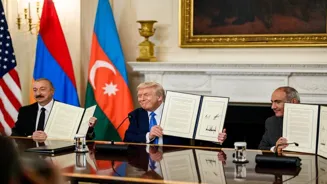This shift in geopolitics and geo-economics has brought about the emergence of various conflict theatres worldwide. The current geopolitical and geoeconomic turbulence began with the Covid-19 pandemic, which completely disrupted the global economic order. In 2022, Russia’s invasion of Ukraine opened up a major theatre of global geopolitical upheaval. At the same time, tensions were intensifying in the South Caucasus. In 2020, Azerbaijan launched a military offensive, reigniting the dispute over Nagorno-Karabakh. For the first time, the massive use of drones in warfare sparked major debates on the future of armed conflict and the role of loitering munitions.
In 2023, another flare-up occurred between Armenia and Azerbaijan, leading the global strategic community to expect further escalation in 2025. However, quite unexpectedly, a truce has been reached between the two countries, with US President Donald Trump playing a role in 'brokering' the agreement.
Understanding the details of this peace treaty is essential. On one hand, Azerbaijan will gain access to the Nakhchivan enclave, enabling it to connect its territory through the development of a multimodal transport corridor through Armenia to be managed by the United States. Turkey, in turn, will gain access to Azerbaijan via the same corridor. While this deal clearly benefits Azerbaijan and Turkey, uncertainty remains over whether Azerbaijan will return occupied territories to Armenia or withdraw its military forces from border areas.
Russia’s role in the region has diminished significantly, and Armenia’s tilt toward the Western bloc is now clear and decisive. Until recently, there was uncertainty in the strategic community over whether Armenia leaned toward the West or toward Russia. Even the Armenian government had engaged in a delicate balancing act between the two. With this deal, Armenia’s choice has become evident. Turkey will continue to play a decisive role in the South Caucasus. Historically, Turkey and Azerbaijan have acted against Armenia’s strategic interests, but this deal represents Trump’s attempt to accommodate them and grant them a share—possibly more than proportionate—of the benefits. Whether they will abide by the terms of the agreement remains to be seen.
The role of other global actors, particularly India and China, is also significant in this context. India has become increasingly active in the region, largely due to the growing alliance between Turkey, Pakistan, and Azerbaijan. To counter this, India has developed a strategic partnership with Armenia, centred primarily on the sale of defence equipment and weapons. The new deal raises questions about the future of India–Armenia defence relations. Azerbaijan is unlikely to be comfortable with Armenia purchasing Indian arms, as it has objected to such sales in the past. To preserve the peace agreement, the Armenian government may take a more cautious approach and hesitate to buy additional weapons from India.
This situation is further complicated by recent strains in India–US relations, which could impact Armenia’s ties with India. The US government is now likely to discourage Armenia from deepening its partnership with India, particularly given Washington’s perception of India as a close partner of Russia. Furthermore, India’s growing ties with China are unlikely to be well-received by the American establishment.
China, on the other hand, may benefit from the current situation. It enjoys strong ties with Armenia and Azerbaijan and maintains functional relations with Turkey. With the strategic connectivity corridor in place, China could potentially gain access to European markets.
In conclusion, many of Trump’s initiatives have historically been volatile and fragile in nature, and whether this deal will endure remains uncertain. Transforming the vision of a strategic connectivity corridor into reality will require considerable time, and whether Armenia and Azerbaijan can maintain peace over the course of its development remains an open and pressing question.
The author is a Cornell University graduate in public affairs, bachelors from St Stephen’s College, Delhi and has done his PhD on Jaish-e-Mohammad. He is a policy analyst specialising in counterterrorism, Indian foreign policy and Afghanistan-Pakistan geopolitics. Views expressed in the above piece are personal and solely those of the author. They do not necessarily reflect Firstpost’s views.















